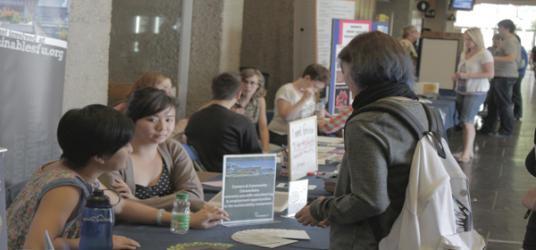
Have you ever wondered what organizations look for from students and recent graduates at a career fair? I had the fantastic opportunity to interview Scotia Bank, Clio, Sun Life Financial, City of Richmond, MyPlanet and Public Outreach at the miniBIG fair this year, and received insight on what these employers are looking for from students. Read on to discover what these organizations had to say about tips to succeed at a career fair.
From your perspective, how could a student or recent grad make the most out of their experience from attending a career fair?
Be Prepared
The general consensus from all six organizations was to be prepared when coming to a career fair. What employers meant by “being prepared” was:
Bring Your Current Resume
Speaking with Maura Pires of Scotia Bank revealed that specific companies want to help students find a career within their company. By bringing your current resume they are able to a) Show the skillset needed for that industry and b) Determine your current skill set and goals and help find them a place within their company. “Because banking is a big world, if I can figure out where their goals are then I can help assist them to refer them to other areas in the bank.” – Maura Pires, Scotia Bank
Prepare Good Questions
Preparing good questions for specific organizations is extremely important because it shows that you are serious about working for their organization and is someone who takes initiative. As Jesse Burtenshaw of Sun Life Financial said, “all the employers at [miniBig] want the best of the best. Employers want individuals who can take initiative in a role.” That being said, if you show an employer that you can take initiative in your everyday life, it also shows that you will transfer that attitude towards your work life as well.
Know the industry you want to work for and prepare skills that are targeted for that industry
Wing Ho from the City of Richmond mentioned that “having a clear objective in mind allows employers to match student’s current skills to current opportunities available more easily.” By coming prepared with skills that you feel could benefit the employer, you are able to come off as a desirable prospect for their company.
What qualities make students stand out to employers?
Passion
Katrina Heschel of MyPlanet mentioned that employers like students who are “passionate about what they are doing in university and have work experience or volunteer experience outside of their university experience.” If you can show an employer that you are passionate about something and the work experience you are doing or have done, they are more likely to hire you because you are going to work hard and be pleasant to be around.
Confidence
Both Jesse Tallent from Public Outreach and Maura Pires from Scotia Bank both emphasized that having confidence is critically important to an employer. For instance, Maura Pires from Scotia Bank mentioned that having a “calm confidence is important, because Scotia Bank is a people industry; you have to be able to deliver confidence to the customer.”
Being Open Minded
Jesse Tallent at Public Outreach emphasized the importance of showing an employer at a career fair that you are open minded to working with people from all backgrounds, genders and individuals. The reality of working for an organization like Public Outreach, is that you are constantly dealing with the public, so it is really important to “really like people” as Jesse mentioned, since a majority of your time spent will be working with people.
How do you prefer students to follow-up and build a relationship with an employer after attending a career fair?
From speaking to the six organizations at miniBIG, all six unanimously agreed that following up via email was the best. When asked about using LinkedIn as an alternative follow-up tool Katrina Heschel from MyPlanet responded:
“On LinkedIn, it is a little harder to track where people are coming from. We come to [SFU] and we see 75 people, and a student shows up on our profile wanting to become a connection…It may be more beneficial to send an email.”
To expand on Katrina’s response, if you decide to follow-up with an employer via LinkedIn, ensure that you are following up with a personal message rather than a standard one.
When following up by email, be sure to include:
-
Where you met your contact
-
What they were talking about at the time
-
Where you want to go from there and what you want from the conversation
In addition, make sure to follow-up as soon as you can, to ensure that the contact you met remembers you. Following up with someone can “put you to the top of an application pile” – Jesse Burtenshaw of Sun Life Financial.
Any additional information you would like to share with our readership?
“Getting into the community where there are lots of meet ups and groups where people are just passionate about design and development and just finding your niche and getting around those people because a lot of them are in the industry are looking to connect people for recruitment.”
- Katrina Heschel, MyPlanet
“Scotia Bank is about employee development, you can work in this company for 25 years but you can do 5 different jobs.”
- Maura Pires, Scotia Bank
“Worry less about what degree you get for employability skills and more about getting a degree that you are passionate about.”
- Zachary Pope, Clio
Closing Thoughts
To conclude, I want to thank all the organizations for allowing me to interview them on how to succeed at a career fair. I just wanted to note that while all information is valuable, it is important to understand that the employer’s tips are guided by the industry they represent. That being said, key tips for all students is to show employers that you are prepared, have passion for what you do, have confidence in your skillset and have the ability to interact with all people of different backgrounds. If you are able to keep these four points in mind, you are bound to set yourself up for success.














